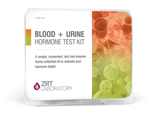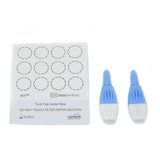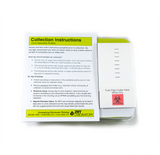-
Iodine (I): Iodine is an essential mineral required for the production of thyroid hormones. Adequate iodine levels are crucial for proper thyroid function.
-
Bromine (Br): Bromine is a halogen element that can potentially interfere with iodine uptake in the thyroid gland. Elevated bromine levels may negatively impact thyroid health.
-
Arsenic (As): Arsenic is a toxic heavy metal that can affect thyroid function and hormone synthesis. Elevated levels of arsenic may disrupt normal thyroid activity.
-
Selenium (Se): Selenium is a trace mineral that plays a vital role in thyroid hormone metabolism and the functioning of the thyroid gland. Adequate selenium levels are necessary for optimal thyroid health.
-
Creatinine (Crtn): Creatinine is a waste product produced by muscles that is eliminated through the kidneys. Measuring creatinine levels helps evaluate kidney function, which can indirectly impact thyroid health.
-
Cadmium (Cd): Cadmium is a toxic heavy metal that can accumulate in the body and interfere with thyroid function. High levels of cadmium may impair thyroid hormone production.
-
Lithium (Li): Lithium is a medication commonly used to treat certain mental health conditions. It can influence thyroid function and may require monitoring if prescribed.
-
Mercury (Hg): Mercury is a toxic heavy metal that can disrupt thyroid hormone synthesis and function. Elevated levels of mercury may affect overall thyroid health.
-
Total T4: Total thyroxine is a measure of the overall amount of thyroid hormone produced by the thyroid gland. It helps assess thyroid function and hormone levels.
-
Thyroglobulin (Tgbn): Thyroglobulin is a protein produced by the thyroid gland and is involved in the synthesis of thyroid hormones. Measurement of thyroglobulin levels can aid in the evaluation of certain thyroid conditions.
-
Thyroid Stimulating Hormone (TSH): TSH is a hormone released by the pituitary gland that stimulates the thyroid gland to produce thyroid hormones. TSH levels are commonly used to assess thyroid function and detect abnormalities.
-
Free Triiodothyronine (fT3): Free triiodothyronine is an active form of thyroid hormone that influences various metabolic processes in the body. Measuring fT3 levels helps evaluate thyroid function and hormone activity.
-
Thyroid Peroxidase Antibody (TPOab): TPO antibodies are autoantibodies that can be present in autoimmune thyroid diseases such as Hashimoto's thyroiditis and Graves' disease. Detecting TPO antibodies helps diagnose and monitor these conditions.
-
Free Thyroxine (fT4): Free thyroxine is an unbound form of thyroid hormone that plays a critical role in regulating metabolism. Measuring fT4 levels aids in assessing thyroid function and hormone levels.
- The test kit contains a Blood and Urine Spot collection kit.
- Samples can be collected in the comfort of your home.
- The test is suitable for both adults and children.
- Free delivery in the UK
- Customers are responsible for shipment to the laboratory.
- The test kit includes a laboratory fee: no additional laboratory cost or tax.
- Test Result: You will receive your test result via email within 3-5 working days after Laboratory receives your sample. On your test result, you will see your hormone levels in graphics and numbers. You will also see the Laboratory's comments by Hormone Specialist PhD Dr. on your test result, which suggests a healthy diet, what kind of exercise you should do and some reading materials on how to maintain your hormone level balanced.
- Click to see>>> Sample Test Result Report
- Test Requisition Form includes Symptom Checklist
- Requisition Form to complete, including your personal and medical history
- Contains collection instructions
- Blood & Urine Collecting Cards (Dry Urine & Dry Blood Spot)
- Instructions on How to Use Collection Kit
- Return Envelope
- Shipping Instruction
Symptoms Related To Thyroid:
- Symptoms of under-active thyroid (hypothyroidism) are tiredness, slow movements and thoughts, sensitivity to cold, weight gain, muscle aches, muscle cramps, brittle hair and nails, dry and scaly skin, constipation, depression, loss of libido (sex drive), pain/numbness and a tingling sensation in hand and fingers,(women) irregular periods / heavy periods.
- Symptoms of an overactive thyroid (hyperthyroidism) are mood swings, nervousness, anxiety, irritability, feeling tired all the time, sensitivity to heat, muscle weakness, diarrhoea, needing to pee often, persistent thirst, difficulty sleeping, hyperactivity, itchiness, loss of interest in sex.
- Common signs of an overactive thyroid are twitching or trembling, irregular heart rate, unprecedented fast heart rate, red palms of hands, warm skin and excessive sweating, loose nails, a raised itchy rash, hair loss or thinning, weight loss, eye problems (redness, dryness or vision problems.
Who Should Use Thyroid Test?
This thyroid test is for Individuals who are required to do thyroid screening. Routine screening is recommended for:
- Individuals over the age of 50
- Anyone with a family history of thyroid disorders
- People experiencing symptoms of thyroid dysfunction
- Children who have Down’s Syndrome
- People with autoimmune disorders, especially those with a history of autoimmune thyroids
Elements that Affect Thyroid Function
We are all, to varying degrees, depending on our dietary choices, our supplementation routine, or our lifestyle, exposed to the elements iodine, bromine, selenium, arsenic, and mercury. Levels of these elements in the food we eat are determined by soil levels and other environmental exposure of plants and animals that end up in the food chain and, ultimately on our own dining tables. We can also be directly exposed to elements through environmental pollution of the air we breathe, as well as exposure through our skin.
How does exposure to these elements affect health?
Iodine is an essential component of T3 and T4, so its deficiency has a serious impact on thyroid hormone synthesis, while bromine is in the same chemical family as iodine and excessive amounts will compete with iodine in the thyroid. Selenium is a component of the selenoproteins, including the iodothyronine deiodinases, which convert inactive T4 to its active form in the body (T3), and glutathione peroxidase, which prevents free radical damage to the thyroid by destroying the hydrogen peroxide that is a by-product of thyroid hormone synthesis. Arsenic and mercury are toxic heavy metals that form tight complexes with selenium and therefore reduce selenium’s bioavailability, resulting in biological effects similar to selenium deficiency, including disruption to thyroid health. While bromine, arsenic, and mercury are known as biological toxins, even iodine and selenium can potentially be toxic if dietary intake, including excessive supplementation, is too high.
Our Thyroid Test Profile can help to determine if there is an imbalance of thyroid hormones and what to do next.
Thyroid Test in Dried Blood Spot
TSH – Thyroid Stimulating Hormone
TSH is produced by the pituitary, and it acts on the thyroid gland to stimulate the production of the thyroid hormone T4 and T3. Higher than normal TSH can indicate overproduction of, or excessive supplementation with T4 and/or T3, which acts in negative feedback on the pituitary to reduce TSH production. Low TSH can also be caused by problems in the pituitary gland itself, which result in insufficient TSH being produced to stimulate the thyroid (secondary hypothyroidism).
Free T4- Thyroxine
The predominant hormone is produced by the thyroid gland. It is an inactive hormone and is converted to its active form, T3, within cells. Free T4 is the non-protein-bound fraction of the T4 circulating in the blood, representing about 0.04% of the total circulating T4, which is available to tissues. Low TSH combined with low T4 levels indicates hyperthyroidism. High TSH and low T4 indicate a thyroid gland disease, such as autoimmune thyroiditis (Hashimoto’s).
Total T4 – Thyroxine
Total T4 includes both free T4 and protein-bound T4 and therefore represents the thyroid gland’s capacity to synthesise, process, and release T4 into the bloodstream. In contrast, free T4 represents only the circulating hormone that is bioavailable and not tightly complex with thyroid-binding globulin (TBG). Certain conditions, like oral estrogen usage or pregnancy, can cause total levels to change due to the liver- induction of TBG. This can result in no change in free T4 or lower bioavailable levels of free T4, even though total T4 increases.
Free T3 – Triiodothyronine
Free T3 is the non-protein-bound fraction circulating in the blood, representing about 0.4% of the total circulating T3, which is available to tissues. Elevated T3 levels are seen in hyperthyroid patients, but levels can be normal in hypothyroid patients because it does not represent the intracellular conversion of T4 to T3, which comprises about 60% of all T3 formed in tissues.
TPO – Thyroid Peroxidase Antibodies
Thyroid peroxidase is an enzyme used by the thyroid gland in the manufacture of thyroid hormones by liberating iodine for attachment to tyrosine residues on thyroglobulin. In patients with autoimmune thyroiditis (predominantly Hashimoto’s disease), the body produces antibodies that attack the thyroid gland, and levels of these antibodies in the blood can diagnose this condition and indicate the extent of the disease.
Tgbn - Thyroglobulin
A protein which is rich in tyrosine and synthesised only in the thyroid gland. When bound to iodine, tyrosine residues in thyroglobulin become the source material for the synthesis of the thyroid hormones T3 and T4. When iodine levels are low, high levels of thyroglobulin can be found in the blood as iodine-poor thyroglobulin builds up and leaks from the thyroid into the bloodstream. Levels of thyroglobulin are an indicator of a person’s average iodine exposure over a period of weeks: the greater the iodine exposure, the lower the thyroglobulin level. Elevated thyroglobulin in the absence of more serious thyroid diseases such as thyroid cancer, which results in very high blood thyroglobulin levels, indicates low iodine status.
Advantages of a Simple Blood Spot Test
- Phlebotomist or centrifugation is not required; therefore less expensive and more convenient than conventional blood draws.
- A nearly painless finger prick is used to collect the few drops of blood required.
- Private and convenient for both patient and healthcare provider - collection at home or provider’s office
- Hormones and other analyses are stable in dried blood spots at room temperature for weeks, allowing for worldwide shipment.
- Safe handling and transport of samples, as infectious agents are destroyed by drying.
Thyroid Tests in Dried Urine
Iodine
Bromine
Selenium
Arsenic
Arsenic is a heavy metal with multiple toxic effects on the body, including carcinogenesis, goitre, diabetes, skin diseases, and damage to the liver, kidney, and the cardiovascular, nervous, and endocrine systems. It also competes with selenium, preventing its incorporation into the selenoproteins. This reduces the levels of selenium-containing antioxidants and also the selenoenzymes that are essential for thyroid hormone production, thereby severely compromising thyroid function. Dried Urinary arsenic is a good indicator of recent arsenic exposure since around 80% of dietary arsenic is excreted into urine within 3 days.
Mercury
Besides occupational exposure, most human exposure to mercury is through dental amalgams, seafood, and vaccinations. Mercury toxicity can cause nervous system damage, leading to symptoms such as paresthesia, mood changes, and sensory disturbances, while very excessive exposure can also lead to renal toxicity, respiratory failure and death. Mercury and selenium have a very high affinity for each other and form a thigh complex; as a result, mercury reduces the biological availability of selenium and may inhibit the formation of selenium-dependent enzymes, affecting thyroid function in the same way as selenium deficiency or arsenic exposure. This is particularly problematic in people with inadequate selenium intake and consequent low selenium levels. Selenium can protect against mercury toxicity by sequestering mercury, reducing its bioavailability. There are three forms of mercury in the environment: elemental, found in batteries, thermometers, and dental amalgams; inorganic compounds, primarily mercuric chloride, present in skin-lightening creams; and organic compounds, primarily methylmercury, found in seafood. Elemental mercury is most commonly breathed in as a vapour and absorbed through the lungs, while inorganic and organic compounds are ingested and absorbed through the intestine. The predominant form of mercury in urine is inorganic mercury. The urinary mercury level is an excellent biomarker for whole-body exposure to both elemental and inorganic mercury.
Creatinine
A metabolic by-product that is excreted at a relatively constant rate as long as kidney function is not impaired. It is measured to correct dried urinary element levels for hydration status; the higher the fluid intake, the lower the creatinine level. Iodine, bromine, selenium, arsenic, and mercury results are therefore expressed in µg/g creatinine to allow for urine dilution.
Advantages of Dried Urine for Testing Iodine, Bromine, Selenium, Arsenic, Mercury, and Creatinine:
Urine collection and shipment of the dried filter strips are simple and convenient for the patient and practitioner. Dual collections of urine directly on a filter strip, upon awakening and just before bed, are far more convenient and less subject to the inherent inaccuracies of a 24 h urine collection, yet correlate well with 24 h urine collections. Iodine, bromine, selenium, arsenic, mercury, and creatinine in dried urine are exceptionally stable for weeks at room temperature, allowing more flexibility in the collection, shipment, testing, and storage. Iodine, bromine, selenium, arsenic, and mercury results expressed in µg/g creatinine allow normalisation of results when problems exist with urine that is very concentrated or diluted. Iodine testing allows for the determination of iodine status based on CDC and WHO guidelines for thyroid sufficiency, as well as extra-thyroidal sufficiency.









